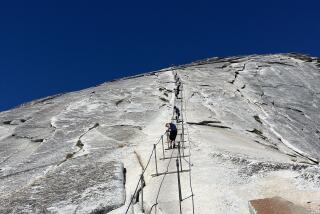Suits Force Mountain Gear Firm to File for Bankruptcy
- Share via
While Yvon Chouinard may be best known for founding Patagonia, the Ventura-based distributor of outdoor clothing, the seeds of his $70-million empire were in the functional climbing gear he first fashioned in the early 1960s in a metalworking shed in his parents’ back yard.
Chouinard Equipment Ltd. posted only $6 million in sales last year. But it was the industry leader, buoyed by the reputations of its high-performance gear and its high-profile founder, who has spent months at a time climbing treacherous ice in Antarctica or scaling Himalayan peaks without taking oxygen.
So industry observers were surprised last month when the firm announced that it was filing for protection under Chapter 11 of the U.S. Bankruptcy Code.
Company officials claimed that the firm’s finances were sound but said that pending lawsuits and the rising cost of liability insurance prompted the move.
“I’ve taken a lot of pride in making the world’s best climbing equipment and trying to do a good job at it, but times have changed,” Chouinard said this week. “Nobody wants to take responsibility for their actions, to say, ‘I screwed up, it’s my fault, I didn’t bother to learn how to use the gear.’ ”
Company officials said that four lawsuits blame Chouinard for injuries allegedly caused by inadequate instructions and warnings on climbing harnesses and other equipment.
Chouinard denies the allegations. Officials of Lost Arrow, the umbrella firm that runs Patagonia, Chouinard Equipment and several other companies, declined to identify the plaintiffs, or to say where or when the suits had been filed.
“No equipment failed and no equipment broke, but when people get hurt . . . they sue,” said Kevin Sweeney, a Lost Arrow spokesman.
Chouinard said that none of the lawsuits were filed by experienced climbers. They were filed by beginners in climbing school, a window washer and an actor who used the equipment on stage, he said.
Lost Arrow officials, who donate 10% of pretax profits to climbing and environmental causes, said they aren’t trying to evade their responsibilities or liabilities. They said they are trying to ensure the company’s survival.
They want to sever ties with Chouinard Equipment because they fear that Lost Arrow’s $70 million in assets could be attached if a lawsuit against the mountaineering subsidiary succeeds.
As a result, Lost Arrow is trying to sell Chouinard Equipment. Lost Arrow officials hope Chouinard’s 70 employees will be able to raise the money to buy the company themselves.
“It definitely sets a precedent in the industry,” said George Bracksieck, editor of Rock and Ice, a climbing magazine based in Boulder, Colo. “People have sued over equipment failure before, but this is the first time one of the major manufacturers of equipment has taken Chapter 11 because of suits.”
300 Trips Dropped
The increasing number of lawsuits and rising liability insurance costs already have put mountaineers between a rock and a hard place. Last October, liability concerns prompted the Sierra Club to drop all club-sponsored climbing trips requiring ropes or ice axes.
The Los Angeles Sierra Club chapter has dismantled part of its popular mountaineering training course and dropped 300 mountaineering trips from its extensive program of outings.
Some outdoor equipment business people fear that manufacturers and consumers stand to lose if the suits against Chouinard succeed.
“It would have a chilling effect on the climbing industry,” said Michael Kennedy, editor of Climbing, a magazine based in Carbondale, Colo. “The equipment won’t be as good, and people won’t have the money to do testing and development. You’ll end up with a lot of smaller, fly-by-night companies.”
Throughout the industry, climbing aficionados and business people say that while more people are climbing today than ever before, mountaineering remains a high-risk sport with inherent dangers.
Other Firms
“You can have the best equipment, but if you’re high off the ground and make an error, you can get killed pretty easily, and I think that needs to be emphasized,” Kennedy said.
Chouinard is one of only a few firms to file for Chapter 11 in the wake of pending lawsuits. Johns Manville, which manufactured asbestos, and A. H. Robins, which made the Dalkon shield, an intrauterine device that caused severe medical problems for some women, filed for reorganization in two well-publicized cases.
Legal experts said Chouinard might be making a smart move.
“Filing Chapter 11 is not something that is socially reprehensible,” said Kenneth N. Klee, a UCLA law school professor who helped draft the U.S. Bankruptcy Code. “They could be doing two socially progressive things: Keeping the business intact while they find out if they are liable and keeping their employees in jobs while they litigate this issue.”
‘Genuine Problem’
“They’re being pretty straightforward,” agreed Chris Hughes, editor of Specialty News, a Bend, Ore., trade newsletter for the outdoor industry. “It’s a genuine problem for the whole outdoor industry.”
Lost Arrow officials hope that the sale of Chouinard to its employees or another owner might help to discourage further lawsuits and reduce liability insurance costs.
They added that Lost Arrow would retain responsibility for lawsuits filed against products sold before the ownership transfer.
In any case, many who are familiar with Chouinard said the filing signifies the end of an era.
Said Sweeney: “The company’s roots were in hardware gear and to sever those roots does cause sadness around here.”
More to Read
Inside the business of entertainment
The Wide Shot brings you news, analysis and insights on everything from streaming wars to production — and what it all means for the future.
You may occasionally receive promotional content from the Los Angeles Times.










